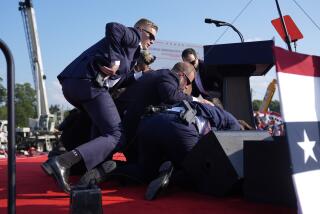Steven Howards and the limits of free speech
- Share via
The Supreme Court this week agreed to hear a case that appears to be a clear-cut example of violation of the 1st Amendment: A protester confronts a public official and is arrested, seemingly because of his opinions.
But Steven Howards’ lawsuit against two Secret Service agents raises issues more complicated than a simple conflict between free speech and heavy-handed government. A victory for Howards would needlessly encumber those charged with protecting the president — and the public.
Howards confronted then-Vice President Dick Cheney in 2006 at a shopping mall in Beaver Creek, Colo. He called the George W. Bush administration’s policies in Iraq “disgusting” and then allegedly pushed Cheney or touched him on the shoulder. He was arrested and detained for several hours.
In filing suits against the Secret Service agents, Howards complained that they had violated the 4th Amendment, which bans unreasonable searches and seizures, in arresting him and the 1st Amendment because his arrest was in retaliation for his expression of opinion. The court will scrutinize the second question.
Most people, regardless of their politics, would say that someone who touches the president or vice president can properly be arrested, as Howards was. But Howards’ suit raises the question of whether an otherwise lawful arrest can subject law enforcement officers to retaliatory lawsuits if the arrested person has been engaging in free speech. A federal appeals court accepted that view in Howards’ case.
The notion that a valid arrest becomes invalid because the arrested person was expressing himself is a radical concept and could have consequences far from the facts of this case. What if federal agents raided a firearms cache of someone who had recently written a pro-gun article with which agents disagreed?
The Secret Service is renowned for its dedication to protecting the president and other officials. So it is doubtful that members of the service would be intimidated by the fear of a personal lawsuit. Even so, there is no need to subject them to damage suits for perfectly lawful conduct. The same is true of other police.
An intelligently reasoned ruling for the Secret Service agents would not allow arrests that only purport to be justified by probable cause or other legal standards. If someone is arrested for his political views, in the absence of real evidence of wrongdoing, the courts could act. But free speech is no protection for lawless conduct.
More to Read
A cure for the common opinion
Get thought-provoking perspectives with our weekly newsletter.
You may occasionally receive promotional content from the Los Angeles Times.










